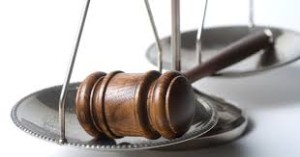Appeals court upholds judge’s order shutting down John Doe probe

By M.D. Kittle | Wisconsin Reporter
MADISON, Wis. — Not a good day for John Doe prosecutors-turned defendants in a civil rights lawsuit.
The 7th Circuit U.S. Court of Appeals on Monday ruled that a lower court did have the authority to issue a preliminary injunction, shutting down the nearly 3-year-old John Doe investigation into dozens of conservative targets.
Prosecutors in that investigation — including Milwaukee County District Attorney John Chisholm, a Democrat, two of his assistant DAs, John Doe special prosecutor Francis Schmitz and Dean Nickel, a contracted investigator — had sought relief from the appeals court, asking that the 7th Circuit stay the preliminary injunction.
DENIED: 7th Circuit U.S. Court of Appeals on Monday upheld a lower court’s order shutting down on a lengthy John Doe investigation into conservative organizations.
Chisholm and crew invoked the 11th Amendment of the U.S. Constitution, asserting that they have sovereign immunity from such legal actions.
Not so much, the three-judge 7th Circuit appeals court answered.
The prosecutors’ “invocation of immunity does not affect litigation under Ex parte Young,” referring to a century-plus-old Supreme Court ruling that allows lawsuits in federal courts against state officials despite a state’s claim of “Sovereign immunity.”
“The district court therefore had authority, notwithstanding the appeals, to issue an injunction,” the appeals court writes.
In early May, U.S. District Court Judge Rudolph Randa issued the preliminary injunction halting the probe, that ostensibly began in late summer 2012, although a new Wall Street Journal editorial notes a court document that shows a previous John Doe investigation into conservatives, launched in May 2010, never really ended.
Randa, federal judge for the U.S. District Court Eastern District of Wisconsin in Milwaukee, ruled that the prosecutors must “cease all activities related to the investigation, return all property seized in the investigation from any individual or organization, and permanently destroy all copies of information and other materials obtained through the investigation.”
One day later, the 7th Circuit stayed Randa’s order because Randa had not ruled on whether he believed the prosecutors’ claims to be frivolous. Randa, the next day, did so, and reinstated his order shutting down the probe.
But the appeals court’s stay on Randa’s “return-and-destroy” order remains in effect while the prosecutors appeal the lower court’s ruling.
Conservative activist Eric O’Keefe and his Wisconsin Club for Growth in February filed a civil rights lawsuit against the John Doe prosecutors, claiming they had violated the civil rights, particularly the First Amendment rights, of conservatives targeted in the probe. The lawsuit asked the federal court to shut down the investigation, and it seeks professional and personal damages from the defendants.
Prosecutors have operated under a theory that dozens of conservative organizations may have illegally coordinated with the campaign of Gov. Scott Walker. Randa has described that theory as “simply wrong.”
A legal expert with knowledge of the John Doe told Wisconsin Reporter that the prosecutors’ claim of immunity is quickly melting under the intense heat of constitutional law.
“Of the four federal judges to review the prosecutors’ most important argument — that the plaintiffs’ injunctive-relief claims are barred by sovereign immunity — all four of them have rejected it as ‘frivolous,’” the expert said on condition of anonymity due to proximity to the investigation.
The appeals court said it needs further information to determine whether the prosecutors’ appeals asserting qualified immunity from damages are frivolous.
Some of the prosecutors’ filings, the 7th Circuit notes, argue that the civil rights complaint is “inadequate.”
That would be “problematic,” the appeals court states.
“(I)f appellants are arguing that the law is not clearly established in plaintiffs’ favor … then we have jurisdiction over the appeals,” the 7th Circuit wrote, noting federal authority to hear the cases despite claims of states’ rights by the prosecutors.
“Those appellants who contend that qualified immunity protects them from awards of damages have 14 days to file memoranda explaining what issues they plan to raise on appeal,” the appeals court writes.
In its ruling, the 7th Circuit did stay proceedings in the federal district court related to damages.
The court also vacated its briefing schedule, issued in May. That schedule included proceedings that extended into August. The court will “establish a new schedule after all jurisdictional issues have been resolved.”
John Doe prosecutors have repeatedly declined to comment.







